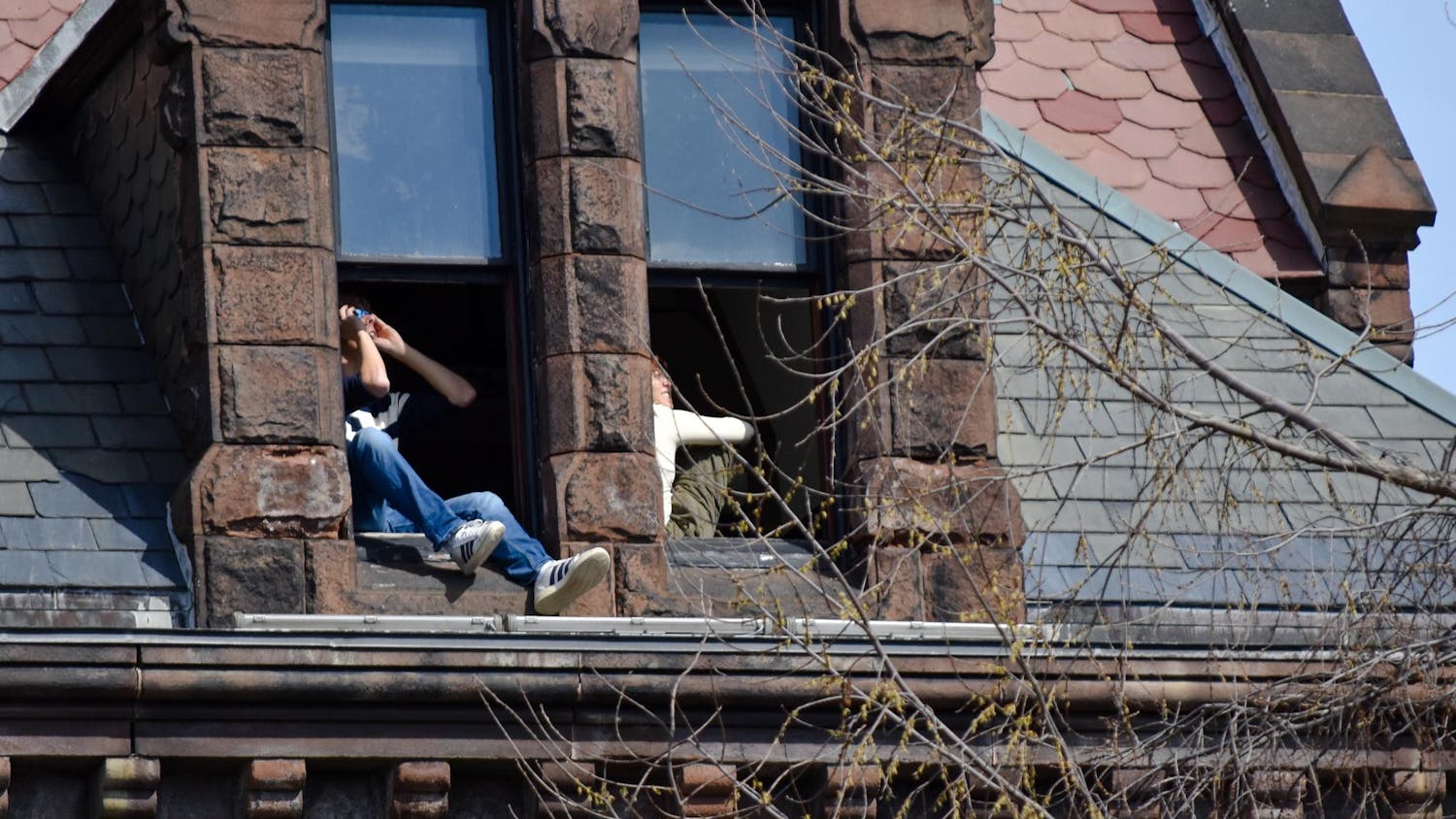During my last week of classes at Brown, I wrestled the fourth dimension and tried to travel back in time. For seven days, I vowed to stop using any technology that did not exist in 1988, the year the majority of the students in the class of 2010 were born. This meant no Internet, no e-mail, no text messaging, no thousands of songs on my iPod. I failed.
My attempted "week in 1988" was flawed to begin with, of course. Doing away with e-mail completely during the last week of the semester — especially the last week of the last semester — is ridiculous, if not idiotic. So I made exceptions: I would check my e-mail a couple of times a day (never on my phone) to make sure I wasn't missing important messages from professors; I brought my cell phone with me when I left the house, just in case (pretending it was a car phone); I listened to music on my iPod (but restricted my listening to music recorded in 1988 and before).
I also cheated: I used an online Spanish dictionary to find out if the correct preposition for "to look" is "for" or "of"; I skimmed the Wikipedia entry on "rhizome"; I e-mailed friends for our weekly viewing of "Lost"; and, in a temperature-related outfit crisis before my thesis reading, I checked the hour-by-hour weather forecast.
I resisted some, too: I did not look up the cola nut's role in modern sodas or the process that makes corned beef "corned"; I did not search for images of nettles or for their potential edible uses; I did not read the Wikipedia entry on the Chicago flag to remind myself of the symbolism behind its stars; I fought, with all my might, against the repetitive urge to solidify the difference between concrete and cement.
When my week without modern technology surged to a close, I basked in the glow of my computer screen, its flashing banner ads and pixelated black text against stark white. I sent more text messages than normal, as if to make up for lost time. I cut through pages of Wikipedia, blogs and Facebook. I played catch-up.
Clicking away
During my week, I did not visit the New York Times website, but that's not a big change — I get the paper delivered every day and, though I normally check the site a few times during the day if I see an article I want to read, I look for it in print first.
There are two reasons behind my insistence on paper, and both reveal part of the motivation behind my experiment, the reason why I would try to do without the information superhighway, my favorite invention.
First, I really do care about the fate of print media, though I will speak without hesitation about the glories of the Internet and the countless articles I read as light projected from a computer screen. But standards for Internet journalism are not the same as those for print journalism. It's much easier to correct an online article — and much more subtle — than to print a correction the next day in the paper. The Internet is about speed; the newspaper is about accuracy and writing.
The second reason, closely linked to the first, is that I have a hard time absorbing things I read on the computer. It's partly the light and the hunched-back, unblinking stupor a computer demands. But it's mostly the urge to click elsewhere, to follow new links before they have been contextualized, to find the best possible version of any song, article, celebrity photo or well-priced bestseller.
That urge has translated to reading books, too. There is the need to be doing as many things as possible. Read while watching television, or read while watching the latest pseudo-campy music video. Never just read.
I thought going a week without technology would imbue my reading with a pre-Internet calm, but a week is not long enough to change the habits that have grown up with me. These are the habits that encourage the constant intersection of the digital and the analog, habits that nearly mirrored my own development and intellectual tendencies.
Text twist
The Internet was just one strand of my week unplugged. Having equal weight — in terms of convenience and social comfort — was text messaging.
I less-than-fondly remember the days of my first year in college, when I was restricted to a mere 100 messages a month. Such a limit required a numerically watchful eye. This time, the limit — the removal of the technology altogether — required stubborn willpower.
I turned off text-message notifications on my phone and let my friends know I would only communicate remotely by speaking. I also asked them to help me avoid temptation. A few messages rolled in, and in an unthinking, Sunday-morning moment, I fell back on muscle memory and almost shot futureward into 2010. I caught myself.
Not sending text messages cuts off distinct parts of social communication. When it comes to communication of low consequence, we are a generation more comfortable working with short bursts of text rather than dealing with stuttered telephone conversations. Talking about plans on the telephone gives them more weight and makes it more difficult to be flaky. Talking also restricts whom we're willing to get in touch with. Peripheral friends would stay that way much longer if it weren't for the casual, impersonal text message.
And, for me, someone who still sometimes relies on a scribbled script for a long-put off phone call, the removal of text messages was the removal of a well-loved crutch.
The lack of text messages also cuts off trivial communication. The text is a near-perfect medium for anecdotes and overheard-on-the-Main-Green snippets. But a phone call instills in those observations — small, banal, hilarious — too much expectation. The phone call is not instant enough. Or maybe it's that the phone call is not read; in reading text messages, the recipients make it their own in a way speech does not allow. But this is a digression better suited for the digital world, where I can stumble around Wikipedia, and stumble in private.
The cell phone itself is a remarkably useful object. There is something so instinctive in idly checking the phone for missed calls or text messages, or just idly looking at it. The cell phone is a game. The cell phone is a social signifier. The cell phone is not just a cell phone.
During my week off I did not check my phone in class, did not tap e-mails beneath my desk. I did not do whatever it is people do when they're "on their phones" while waiting for friends to show up. And though I know there were cell phones in 1988, I did not talk on mine while walking around; I pretended it was too heavy a machine to comfortably cradle against my cheek for blocks on end. I listened to and left messages. (For some reason I balk at the term "voicemail"; maybe it's because, until its recent demise, a mini-cassette recorder served my house better than any digital device).
The trouble with my experiment has to do with timing and context. Living without modern technology for a week is hardly a commitment. And I was surrounded by people who still did have modern technology; they could text each other to set up plans, stay tuned in to campus goings-on through Facebook, give me a better weather forecast than the New York Times' "pleasant" and "70s."
As long as I had an accomplice, I wasn't too far from the technology I was pretending hadn't been invented yet.
Back to the future
What's more: I wasn't actually without technology. If I had gone the week without checking my e-mail, I would have missed meetings and assignments. I wouldn't have found the prized free food offerings in Morning Mail (which I claimed I needed to read "just in case" something important came up).
I expected a grand lesson would reveal itself, but as the experiment crept to an end, and I could feel the tendrils of technology stretching forth, there was the anticipation of downloading music and Facebook-stalking again. There wasn't much else. It wasn't a return to communicatio
n. It was only a return.
The Internet and text messages are not telephone and mail add-ons. They are replacements; they are what those technologies have become. And they are, to a degree, what we have become. We are not interested in reading complete articles; the overwhelming number of links in any online news article shows that. Songs are mashed together, iPods shuffle and tabbed Internet browsing doesn't just encourage rampant clicking around — it necessitates it. We monitor and we quantify, we click "refresh" to encourage e-mails to arrive rather than wait for the daily mail delivery.
My week of 1988 technology came to a close without so much as a whimper. The futuristic-yet-modern devices I surround myself with had spent the week inching closer after I had tethered them to wall plugs. On the seventh day, the machines asserted their territorial dominance. And they rested, basking in their own steady glow.




